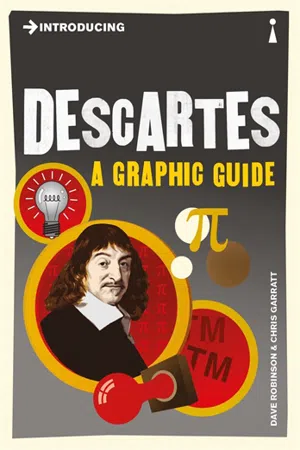
- 176 pages
- English
- ePUB (mobile friendly)
- Available on iOS & Android
eBook - ePub
About this book
René Descartes is famous as the philosopher who was prepared to doubt everything- even his own physical existence. Most people know that he said 'I think, therefore I am', even if they are not always sure what he really meant by it.
Introducing Descartes explains what Descartes doubted, and why he is usually called the father of modern philosophy. It is a clear and accessible guide to all the puzzling questions he asked about human beings and their place in the world. Dave Robinson and Chris Garratt give a lucid account of Descartes' contributions to modern science, mathematics, and the philosophy of mind- and also reveal why he liked to do all of his serious thinking in bed.
Tools to learn more effectively

Saving Books

Keyword Search

Annotating Text

Listen to it instead
Information
Topic
PhilosophySubtopic
Philosopher BiographiesThe Modern Beginner
Everyone agrees that modern philosophy began with Descartes. Why “modern”? Because he insisted on thinking for himself, rather than just accepting what he had been taught. By this method, Descartes believed he could establish the philosophical and mathematical foundations for all of human knowledge – an ambitious quest which eventually turned out to be strangely personal and deeply subjective. Descartes’ philosophy is like a spiritual journey which he invites the reader to join, and which he always promised would produce extraordinary results…
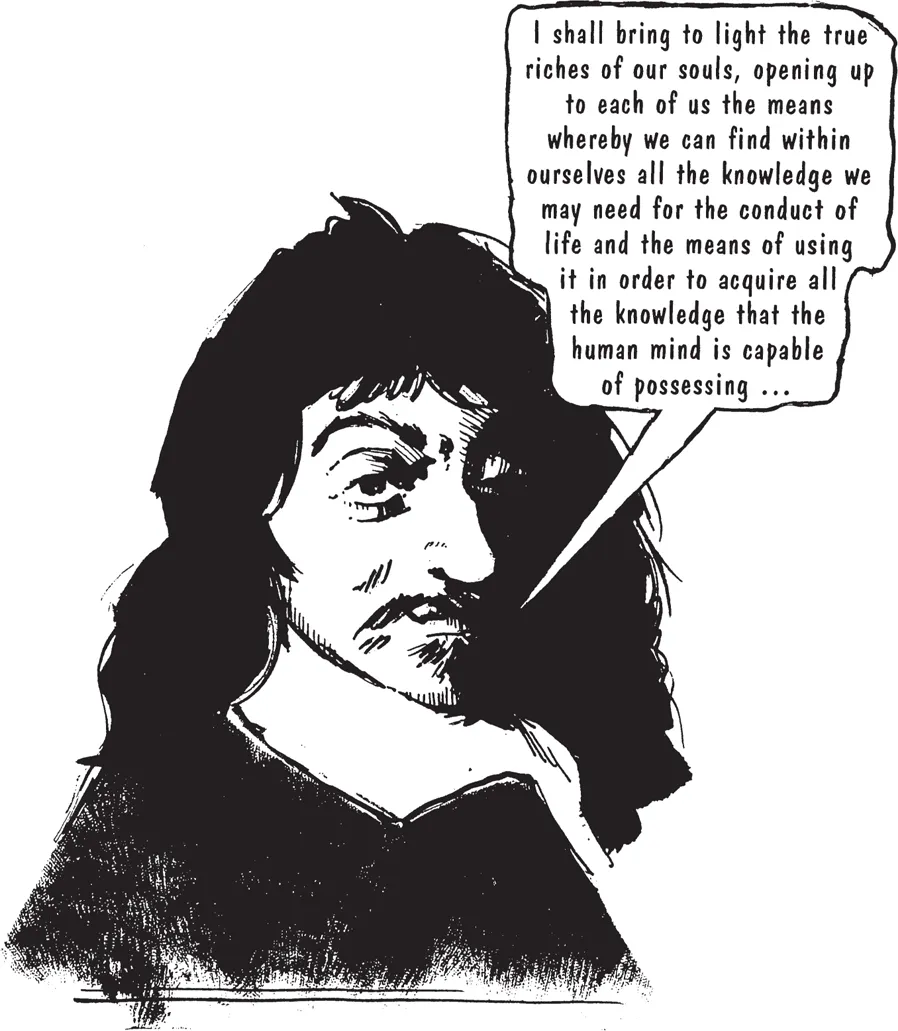
I shall bring to light the true riches of our souls, opening up to each of us the means whereby we can find within ourselves all the knowledge we may need for the conduct of life and the means of using it in order to acquire all the knowledge that the human mind is capable of possessing …
Early Days and Youth
René Descartes was born in 1596 in La Haye, in the Touraine region of France. (The town is now called Descartes!) He was the son of a nobleman, which meant that he never had to work for a living. When he was eight, he was sent to the Jesuit school of La Flèche in Anjou. At this Catholic school he learnt Greek and Latin as well as mathematics and Scholastic philosophy.

At school, I came to the conclusion that mathematics was the only subject of any real worth – a view I held all of my life.
His health was poor and so he was granted permission to stay in bed every morning until 11 o’clock – a habit he kept to in adult life. Descartes always set aside a few morning hours for concentrated thought and devoted the rest of the day to rest and relaxation.
Shortly after leaving La Flèche, Descartes wrote a book that no longer survives called The Art of Fencing, which gave detailed instructions on the different techniques and strategies necessary to beat your opponent. Descartes was said by some to have been as good a swordsman as he was a philosopher. He would have made an interesting fourth musketeer.
Descartes’ first published work was a small treatise on music.

I enjoyed music as much for its mathematical structures as for its pleasing sounds.
Eventually he went on to study law at the University of Poitiers and, although he qualified as a lawyer, he never practised.
The Soldier
Instead, Descartes decided to travel and see a bit of the world.
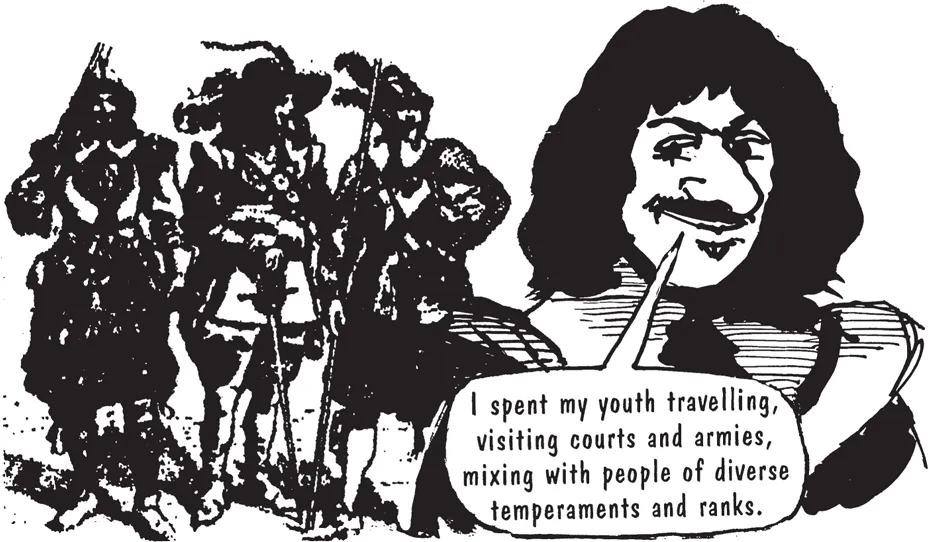
I spent my youth travelling, visiting courts and armies, mixing with people of diverse temperaments and ranks.
He was a small man, with a large head, a big nose and a rather feeble voice. Nevertheless, he became a soldier and joined the army of Maurice of Nassau of the Netherlands, and then the German army of Maximilian of Bavaria. The whole of Europe was being torn apart by the conflicts known as the Thirty Years War (1618-48). Descartes wasn’t cut out for the military life – he consequently absented himself from war and politics. “I am a spectator rather than an actor in the comedies of life.”

One reason for this was a chance meeting on 10 November 1618 in the town of Breda in Holland. Descartes had seen a placard written in Dutch and so asked a passing stranger to translate it for him. The stranger was Isaac Beeckman, who soon became a close friend.

The notice was about a geometric problem which Descartes solved with remarkable rapidity and ease.
Beeckman encouraged me to think about pursuing the life of the mind, rather than the more adventurous but futile life of a soldier.
Beeckman encouraged me to think about pursuing the life of the mind, rather than the more adventurous but futile life of a soldier.
Descartes’ Three Dreams
On 10 November 1619, Descartes found himself stuck in the small town of Neuburg-on-Danube. He was a rather unenthusiastic soldier of 23 en route to see the coronation of Ferdinand II in Frankfurt. But the Bavarian winter was severe and he had to postpone his journey.
“… the onset of Winter detained me in lodgings where, because there was no conversation to amuse me and happily having no worries or passions to trouble me, I stayed all day shut up alone in a stove-heated room, where I was completely free to commune with myself about my own thoughts.”
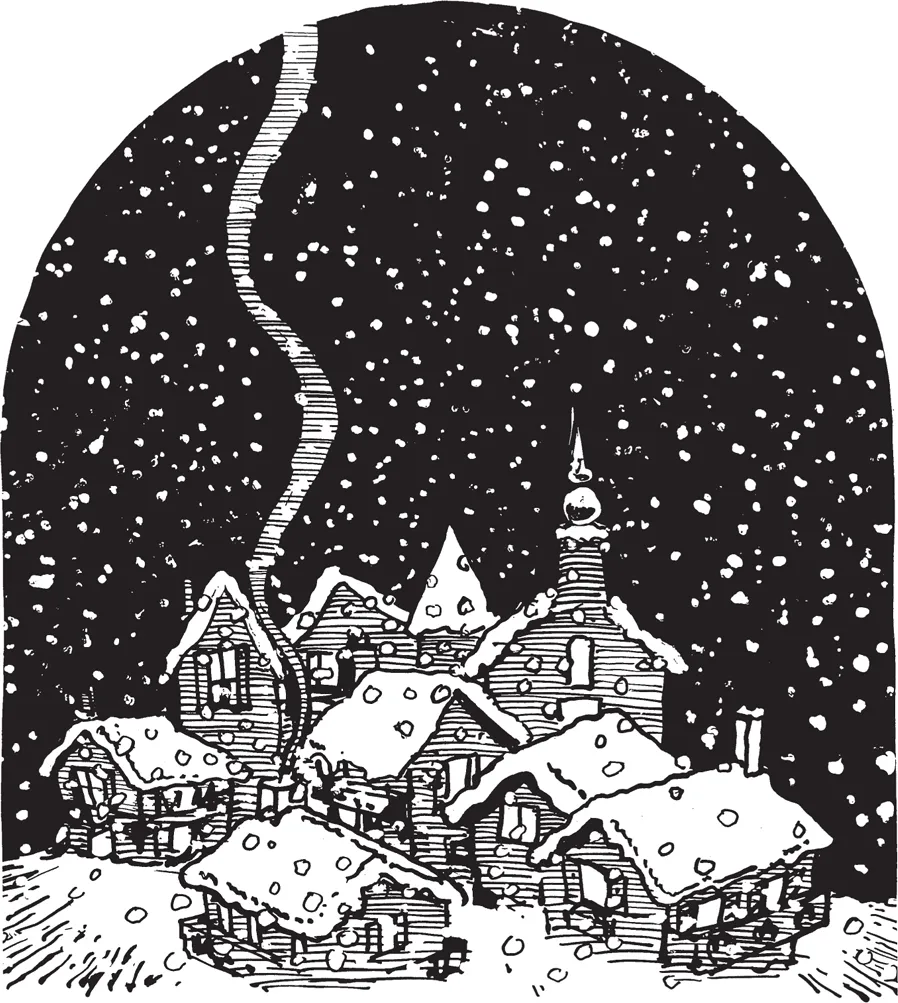
The First and Second Dreams
The thoughts that Descartes had in this stove-heated room, surrounded by blizzards, changed the whole of Western philosophy for ever. He had the most extraordinary sequence of vivid dreams.
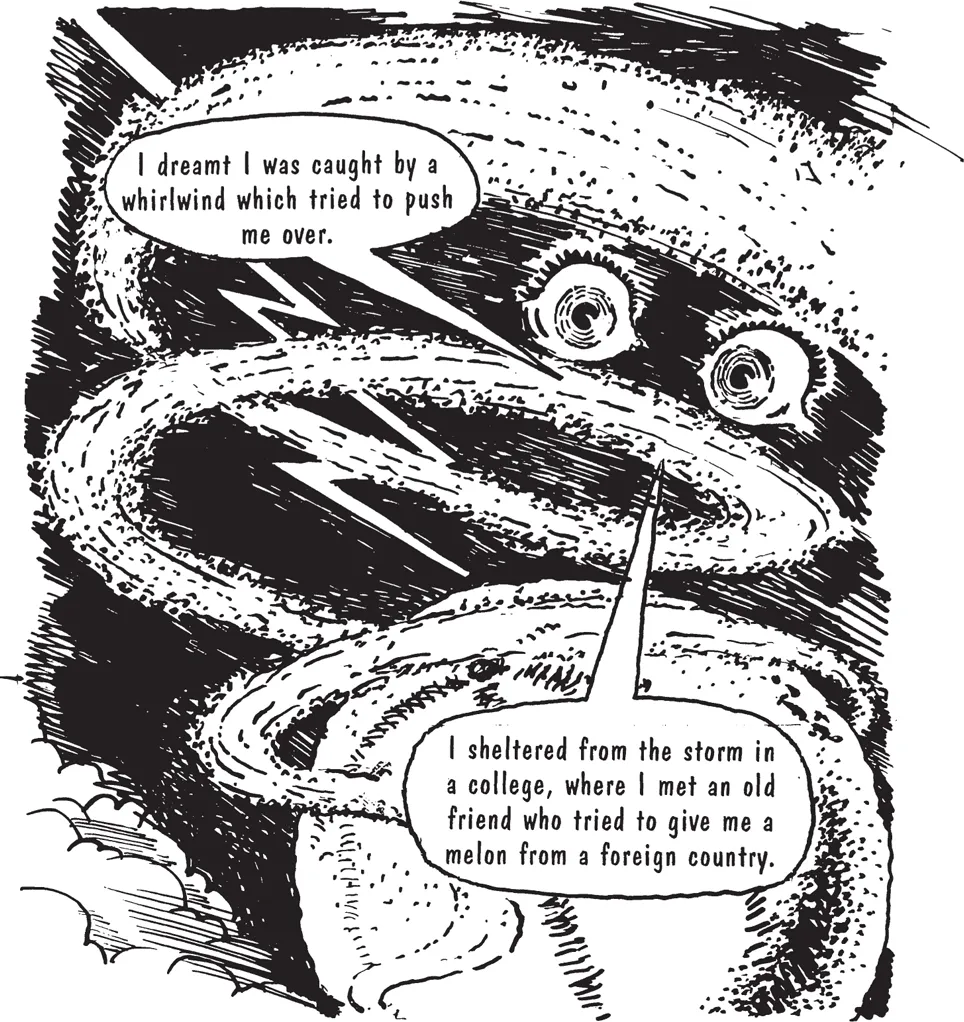
I dreamt I was caught by a whirlwind which tried to push me over.
I sheltered from the storm in a college, where I met an old friend who tried to give me a melon from a foreign country.
I sheltered from the storm in a college, where I met an old friend who tried to give me a melon from a foreign country.
When he awoke he spent the next two hours terrified that this strange vision had been put into his mind by some evil demon.
His next dream wasn’t much of an improvement – he heard a huge thunderclap and found himself trapped in a room full of fire and sparks.
The Third Dream
Fortunately, his third dream was quieter. He was looking at several books by the side of his bed. There was an encyclopedia and an anthology of poems …
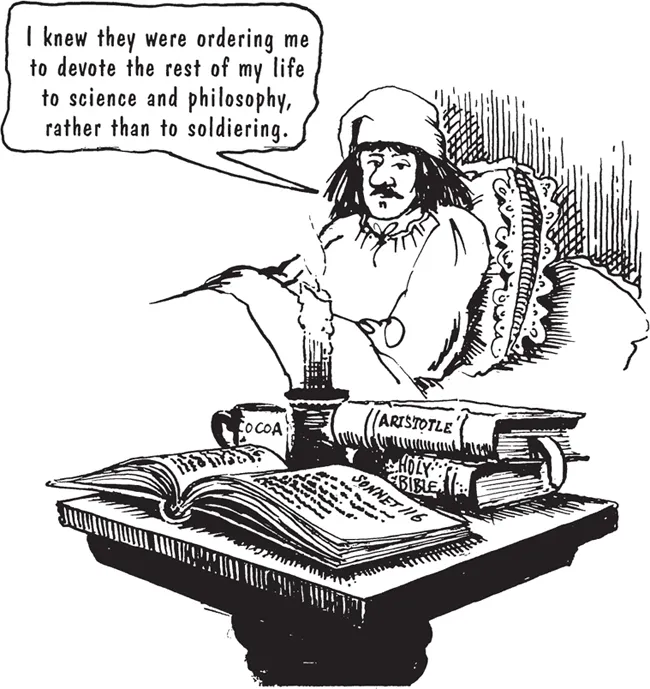
I knew they were ordering me to devote the rest of my life to science and philosophy, rather than to soldiering.
Descartes had always been interested in mathematics and science, and his last dream told him that there was a way in which all human knowledge could be made into a unified whole. “If we could see how the sciences linked together, we would find them no harder to retain in our minds than the series of numbers.”
He always believed in his dream and he never gave up the quest it had set him. Because of this odd night in a cold and strange town, Descartes became the most important a...
Table of contents
- Cover
- Title Page
- Copyright
- Contents
- The Modern Beginner
- Further Reading
- Acknowledgements
- Index
- About the Authors
Frequently asked questions
Yes, you can cancel anytime from the Subscription tab in your account settings on the Perlego website. Your subscription will stay active until the end of your current billing period. Learn how to cancel your subscription
No, books cannot be downloaded as external files, such as PDFs, for use outside of Perlego. However, you can download books within the Perlego app for offline reading on mobile or tablet. Learn how to download books offline
Perlego offers two plans: Essential and Complete
- Essential is ideal for learners and professionals who enjoy exploring a wide range of subjects. Access the Essential Library with 800,000+ trusted titles and best-sellers across business, personal growth, and the humanities. Includes unlimited reading time and Standard Read Aloud voice.
- Complete: Perfect for advanced learners and researchers needing full, unrestricted access. Unlock 1.4M+ books across hundreds of subjects, including academic and specialized titles. The Complete Plan also includes advanced features like Premium Read Aloud and Research Assistant.
We are an online textbook subscription service, where you can get access to an entire online library for less than the price of a single book per month. With over 1 million books across 990+ topics, we’ve got you covered! Learn about our mission
Look out for the read-aloud symbol on your next book to see if you can listen to it. The read-aloud tool reads text aloud for you, highlighting the text as it is being read. You can pause it, speed it up and slow it down. Learn more about Read Aloud
Yes! You can use the Perlego app on both iOS and Android devices to read anytime, anywhere — even offline. Perfect for commutes or when you’re on the go.
Please note we cannot support devices running on iOS 13 and Android 7 or earlier. Learn more about using the app
Please note we cannot support devices running on iOS 13 and Android 7 or earlier. Learn more about using the app
Yes, you can access Introducing Descartes by Dave Robinson,Chris Garratt in PDF and/or ePUB format, as well as other popular books in Philosophy & Philosopher Biographies. We have over one million books available in our catalogue for you to explore.